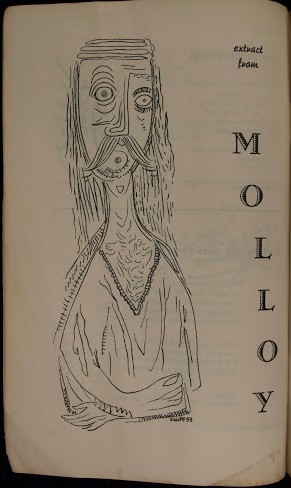The absurdist Samuel Beckett was awarded the Nobel Prize for literature in 1969.
He’s most famous for Waiting for Godot (a play in which pretty much nothing happens in the first act, only to be repeated in the second), was also the author of a novel entitled Molloy. Here is the main character, Molloy, reminiscing over the creature who first acquainted him with love:
“She went by the peaceful name of Ruth, I think, but I can’t say for certain. Perhaps the name was Edith. She had a hole between her legs, oh not the bunghole I had always imagined, but a slit, and in this I put, or rather she put, my so-called virile member, not without difficulty, and I toiled and moiled until I discharged or gave up trying or was begged by her to stop. A mug’s game in my opinion and tiring on top of that, in the long run. But I lent myself to it with a good enough grace, knowing it was love, for she had told me so. She bent over the couch, because of her rheumatism, and in I went from behind. It was the only position she could bear, because of her lumbago. It seemed all right to me, for I had seen dogs, and I was astonished when she confided that you could go about it differently. I wonder what she meant exactly. Perhaps after all she put me in her rectum. A matter of complete indifference to me, I needn’t tell you. But is it true love, in the rectum? That’s what bothers me sometimes. Have I never known true love, after all? She too was an eminently flat woman and she moved with short stiff steps, leaning on an ebony stick. Perhaps she too was a man, yet another of them. But in that case surely our testicles would have collided, while we writhed. Perhaps she held hers tight in her hand, on purpose to avoid it.”
(Source: Samuel Beckett, Molloy, 1951. English edition 1955.)
A favoring critic, Benjamin Kunkel, wrote in the highbrow The New Yorker that the novel is
“famous in the history of fiction because of what is left out: the usual novelistic apparatus of plot, scenes, and characters. … Here, it seems, is the novelistic equivalent of abstract painting.”
(Source: “Sam I Am,” New Yorker (July 30, 2006).
Again: Beckett was awarded the Nobel Prize for literature in 1969.
When the self-proclaimed cultural elite tell you what you are to read and admire, never let that undercut your own judgment of what is in fact healthy and true and beautiful.
Related: My “Why Art Became Ugly,” on the reductionist-nihilist (and other) strategies in modernist and postmodernist art.

Stephen, out of all the undeserving Nobel winners, you had to pick on Beckett?! I don’t know Beckett’s prose, but that excerpt from “Molloy” is hilarious! You do see the humor in it, I hope. “‘Godot” is an enormously important and profound play, in my opinion, symbolizing many aspects of the human experience and stripping the theatrical structure and down to bare bones. It is also funny! A good production of it is poetic and uplifting. Beckett also wrote two more important plays, “Happy Days” and “Krapp’s Last Tape.” (The title of the latter could have been better.) Please give Beckett a second look!